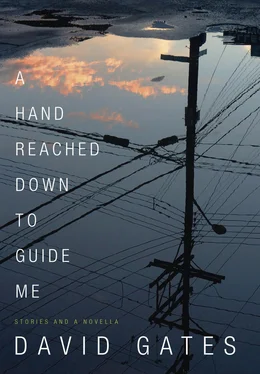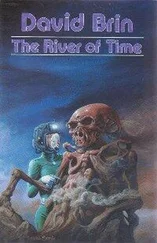David Gates - A Hand Reached Down to Guide Me
Здесь есть возможность читать онлайн «David Gates - A Hand Reached Down to Guide Me» весь текст электронной книги совершенно бесплатно (целиком полную версию без сокращений). В некоторых случаях можно слушать аудио, скачать через торрент в формате fb2 и присутствует краткое содержание. Жанр: Современная проза, на английском языке. Описание произведения, (предисловие) а так же отзывы посетителей доступны на портале библиотеки ЛибКат.
- Название:A Hand Reached Down to Guide Me
- Автор:
- Жанр:
- Год:неизвестен
- ISBN:нет данных
- Рейтинг книги:5 / 5. Голосов: 1
-
Избранное:Добавить в избранное
- Отзывы:
-
Ваша оценка:
- 100
- 1
- 2
- 3
- 4
- 5
A Hand Reached Down to Guide Me: краткое содержание, описание и аннотация
Предлагаем к чтению аннотацию, описание, краткое содержание или предисловие (зависит от того, что написал сам автор книги «A Hand Reached Down to Guide Me»). Если вы не нашли необходимую информацию о книге — напишите в комментариях, мы постараемся отыскать её.
magazine anointed “a true heir to both Raymond Carver and John Cheever.”
A Hand Reached Down to Guide Me Relentlessly inventive, alternately hilarious and tragic, always moving, this book proves yet again that Gates is one of our most talented, witty and emotionally intelligent writers.
A Hand Reached Down to Guide Me — читать онлайн бесплатно полную книгу (весь текст) целиком
Ниже представлен текст книги, разбитый по страницам. Система сохранения места последней прочитанной страницы, позволяет с удобством читать онлайн бесплатно книгу «A Hand Reached Down to Guide Me», без необходимости каждый раз заново искать на чём Вы остановились. Поставьте закладку, и сможете в любой момент перейти на страницу, на которой закончили чтение.
Интервал:
Закладка:
“ You were good to her,” I said.
“We had our issues.” She picked up her glass and drank until the lip touched her nose. “Okay, I probably shouldn’t tell you, but she wasn’t just my first crush , okay?” She raised the empty glass as if to toast. “Go, Jess .” She set it down. “So now you’re thinking, how do I get rid of this person.”
“No, it’s good to have you here.”
“Yeah? Then you must be in Shit City,” she said.
“What I was thinking, if a succubus appeared I wouldn’t turn her down. If I’m understanding you correctly.”
“I don’t really know what that is,” she said. “So how come your wife left?”
“Well, you know, different theories,” I said. “I think the ghosts drove her out.”
“I always push too much,” she said.
“That’s okay,” I said. “I always drink too much and make moves on women.” I got to my feet. “Present company excepted. I’m going to go re-up.”
I took one more good pull from the bottle, put ice cubes into the peacock-feather bowl—Deborah had collected pressed glass—and brought it out to the porch, along with the gin and what was left of the tonic. “You mind keeping your lime?” I said. “Had to make a house rule: No using knives after the first cocktail.”
I held the bottle up and she put her hand over her glass. “I think I’m good. I didn’t freak you out, right? With the ghost stories? Actually I get the feeling there’s nobody here anymore.”
I poured gin, sending my ice cubes into a merry dance. “You and me both, my friend.” I drank, then topped off. “ That is the truest thing you’ve said all day.”
“I used to drive by here sometimes when I was up visiting Gran,” she said. “One time I saw this little girl on the porch, and she was like, swinging in that hammock you used to have up. Was that your daughter?”
“Jesus, I hope to Christ so. Listen, tell me something. Why didn’t you ever stop in?”
“I didn’t think your wife wanted me to. She didn’t like me very much. When we had lunch that time?”
I heard myself say, “I’d always sort of hoped I’d see you.”
“Yeah, well, I’m not a big fan of situations.”
“Ah,” I said. “Now this seems to be leading us into a very interesting place.”
She took her phone out, looked at the screen, got her thumbs going again and put it back in her pocket.
“Here’s the thing about situations, okay?” I said. “Having been in situations myself. What was once a situation can turn into—you see what I’m saying. It’s good you and I can finally talk about this.”
“I don’t know what you think we’re talking about,” she said.
“Ah, deniability,” I said. “I used to be the king of that. But I think we owe each other a little more, no? Or am I being too blunt?”
“Okay, well thanks for the drink and everything.” She set her glass on the arm of the chair and got to her feet.
“You can’t possibly go now ,” I said. I leaned forward and saw my hand around her wrist.
“What the fuck?” She yanked her arm away. “What kind of an asshole are you?”
“Oh,” I said, “just a harmless old drunk, really. You don’t need to leave.”
“Do you have any idea the shit I had to go through? Just to have a life? And you put your hand on me?” She grabbed the bottle by its neck, the handle over her knuckles like the—hell, what’s it called?—on, you know, a buccaneer’s sword.
“Whoa,” I said. “Easy. What say we just wind this back?” I stood up and reached to take the bottle away from her.
She stepped back and swung it against a porch post. It rang off the wood, but she swung it again, smashed it, splashing gin on her jeans and shirt, and held up the jagged, dripping glass that was left. “You don’t even know what the shit you’re dealing with,” she said. She looked at it, then flung it onto the lawn and ran to her car.
I watched her out of sight around the corner and went inside to look in the freezer, though I knew damn well that had been the last of the gin. The whole night still ahead, with the state store closing in an hour.
I took back roads as far as I could, then went through the speed-trap towns with the cruise control locked in at twenty-five. I bought three handles of Tanqueray, as if I were a party giver, opened one in the parking lot and poured a used Styrofoam coffee cup full. I kept it between my thighs the whole way back. But I had the secret of invisibility that night: I could have steered head-on into a van full of children and no one would have seen there was a problem to be addressed.
I pulled in the dooryard, banged into something, walked zigzag to the house and stood swaying in the living room, calling out to Mort till the strings of the piano rang. You see now how funny that is, right, yelling, “Mort! Mort!” to a dead man? I cried out for the little dead girl to come be my little dead girl, I went to my knees and asked Jesus Christ into my heart, I went out onto the porch and hollered across the road at Royall Brown, the Great Disapprover. In the silence—watch out for the false ending now—I heard an apple fall.
—
Have I been showing you a good enough time? Why don’t you come on out, bring your drink, and we’ll get old what’s-his-face down here to do his little buck-and-wing to the tune of “Dear Christian Friend”—would that amuse?—and favor us with his views on how flesh is dust and so on. Or how about a private performance, first time anywhere, of my latest. Oh, I finished it—you didn’t take all that poor-me shit too seriously, I hope—and sent it off to young what’s-his-face. It’s scored for string quartet, but I can approximate it on the piano, if you don’t mind how half-assed it sounds, and at this point in the festivities, what’s the difference? Ted Williams never did sing to me anymore, so I had to patch it together out of this and that—plagiarize it really. You’ll hear a smidgen of Eight Songs for a Mad King in there, a smidgen of Stockhausen’s Momente , a smidgen of “Time in a Bottle” (who says I lack the common touch?). And Feldman, of course—can’t get away from him. That pair of four-note phrases, the second seeming to question the first, at the beginning of Palais de mari: didn’t I work the variations on that sucker. Well, I say you’ll hear this stuff, but it’s all been through the grinder, so you’d have to know what you were listening for.
So here we go: five movements, five sets of variations on five lines of text, word for word from Ted Williams: The Biography of an American Hero .
1. The plan is to live on the big boat.
2. I made a mistake. I need a lawyer.
3. You know who did this to me? Jesus Christ did this to me!
4. You’re the abortion I wanted—how do you say that to your son?
5. At the damn gate of the park, where we always meet.
Don’t you like the little story it tells? I had to chuck out the stuff that inspired me in the first place— Cocksucking fucken syphilitic Jesus and whatnot. Let Roberto Loomis be the Rebel Angel and take up a flaming sword against the Disapprovers. According to the biography, some nurse said that Williams, on his deathbed, finally came to know Jesus was his savior. I thought the third movement was the place for the Wagnerian Jesus drama, then the death-metal family angst in four and finally, in five, the Meeting at the Gate—or the Parting at the Gate, however you want to read it—in pastoral quietude.
So I await my judgment: was I father enough to Roberto Loomis at least? As for you, whom I’ve been trying to sweet-talk this whole time, I get the feeling there’s nobody here anymore. I will have done my important work: you have to picture the hand coming out from under the lid. I drank too much—that is, I drank—though Deborah (as I said) had developed a little problem herself. And I got lost in listening, for which one has to be grateful. Clearly I’ve worked up this farewell aria with some care, but—and here comes the final cadence—I’m going to let you have the last word. Wasn’t I the shit back then?
Читать дальшеИнтервал:
Закладка:
Похожие книги на «A Hand Reached Down to Guide Me»
Представляем Вашему вниманию похожие книги на «A Hand Reached Down to Guide Me» списком для выбора. Мы отобрали схожую по названию и смыслу литературу в надежде предоставить читателям больше вариантов отыскать новые, интересные, ещё непрочитанные произведения.
Обсуждение, отзывы о книге «A Hand Reached Down to Guide Me» и просто собственные мнения читателей. Оставьте ваши комментарии, напишите, что Вы думаете о произведении, его смысле или главных героях. Укажите что конкретно понравилось, а что нет, и почему Вы так считаете.











